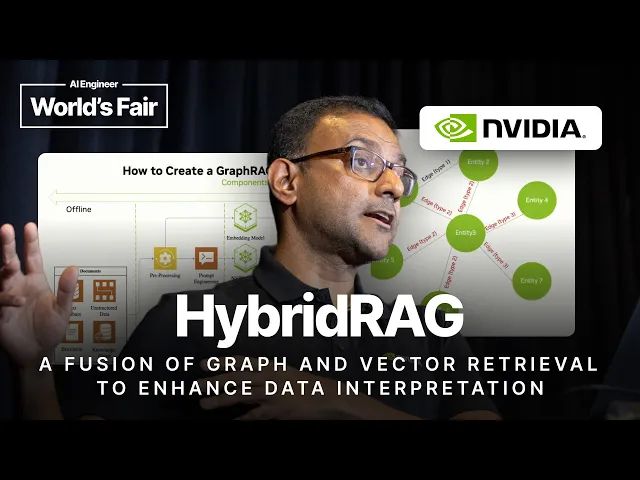HybridRAG: A Fusion of Graph and Vector Retrieval to Enhance Data Interpretation

HybridRAG transforms knowledge access in enterprises
In today's data-driven business landscape, finding the right information at the right time has become the difference between success and failure. A fascinating approach called HybridRAG is emerging as a powerful solution to this challenge, combining graph-based and vector-based retrieval to create more intelligent, context-aware information systems. This innovation promises to revolutionize how enterprises leverage their vast knowledge repositories.
Key Points
-
HybridRAG combines vector retrieval (semantic similarity) with graph retrieval (relationships between entities) to provide more comprehensive and accurate information retrieval than either method alone.
-
Traditional vector-based RAG systems excel at finding semantic similarities but struggle with factual accuracy and hallucinations, while graph-based systems capture precise relationships but miss broader conceptual matches.
-
The hybrid approach creates a synergistic system that leverages both technologies' strengths—vectors for semantic understanding and graphs for structural relationships—resulting in more accurate, contextual responses.
Why This Matters: The Intelligence Breakthrough
The most compelling insight from this technology is how it addresses the fundamental limitations of current retrieval systems. Traditional vector databases excel at finding information that "sounds like" what you're looking for but often miss crucial factual connections. Graph databases capture precise relationships but struggle with conceptual similarities.
HybridRAG's brilliance lies in combining these approaches to create something greater than the sum of its parts. For enterprises drowning in data but starving for insights, this represents a quantum leap forward. Consider a financial services company trying to understand regulatory impacts: vector retrieval might find broadly relevant documents, while graph connections identify specific regulations affecting particular financial products. Together, they deliver a complete picture that neither could provide alone.
This matters tremendously in our current business environment, where information overload threatens productivity while the need for precise, contextual knowledge grows exponentially. According to Gartner, employees spend nearly 20% of their workweek searching for information. Technologies that can dramatically improve information retrieval accuracy directly impact bottom-line productivity and decision quality.
Beyond the Video: Real-World Applications
Healthcare Implementation Case Study
While not mentioned in the presentation, HybridRAG shows particular promise in healthcare settings. A major hospital network implemented a similar hybrid approach for clinical decision support, combining vector search capabilities to fin
Recent Videos
How To Earn MONEY With Images (No Bullsh*t)
Smart earnings from your image collection In today's digital economy, passive income streams have become increasingly accessible to creators with various skill sets. A recent YouTube video cuts through the hype to explore legitimate ways photographers, designers, and even casual smartphone users can monetize their image collections. The strategies outlined don't rely on unrealistic promises or complicated schemes—instead, they focus on established marketplaces with proven revenue potential for image creators. Key Points Stock photography platforms like Shutterstock, Adobe Stock, and Getty Images remain viable income sources when you understand their specific requirements and optimize your submissions accordingly. Specialized marketplaces focusing...
Oct 3, 2025New SHAPE SHIFTING AI Robot Is Freaking People Out
Liquid robots will change everything In the quiet labs of Carnegie Mellon University, scientists have created something that feels plucked from science fiction—a magnetic slime robot that can transform between liquid and solid states, slipping through tight spaces before reassembling on the other side. This technology, showcased in a recent YouTube video, represents a significant leap beyond traditional robotics into a realm where machines mimic not just animal movements, but their fundamental physical properties. While the internet might be buzzing with dystopian concerns about "shape-shifting terminators," the reality offers far more promising applications that could revolutionize medicine, rescue operations, and...
Oct 3, 2025How To Do Homeless AI Tiktok Trend (Tiktok Homeless AI Tutorial)
AI homeless trend raises ethical concerns In an era where social media trends evolve faster than we can comprehend them, TikTok's "homeless AI" trend has sparked both creative engagement and serious ethical questions. The trend, which involves using AI to transform ordinary photos into images depicting homelessness, has rapidly gained traction across the platform, with creators eagerly jumping on board to showcase their digital transformations. While the technical process is relatively straightforward, the implications of digitally "becoming homeless" for entertainment deserve careful consideration. The video tutorial provides a step-by-step guide on creating these AI-generated images, explaining how users can transform...
